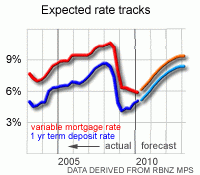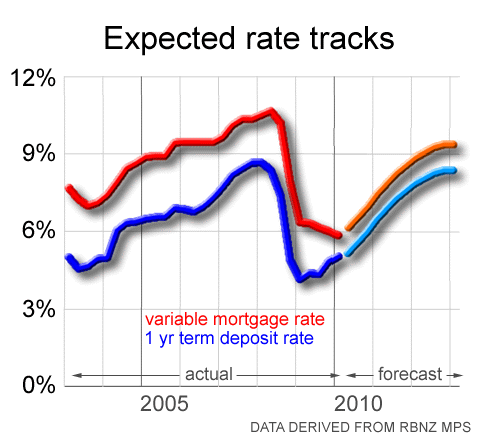
Are you ready for 9% variable mortgage rates and 8% deposit rates?
![]() Now that the dust has settled from the Reserve Bank's widely expected decision to put up the Official Cash Rate (OCR) to 2.75%, it's worth looking at what the last week's events will eventually mean for mortgage borrowers and term deposit savers. I'll keep updating this ahead of the next decision due on July 29.
Now that the dust has settled from the Reserve Bank's widely expected decision to put up the Official Cash Rate (OCR) to 2.75%, it's worth looking at what the last week's events will eventually mean for mortgage borrowers and term deposit savers. I'll keep updating this ahead of the next decision due on July 29.
Governor Alan Bollard's decision was widely telegraphed and he was at pains to say it was no big deal. The rate increase itself was small and from a record low base.
But the forecasts within the Monetary Policy Statement that came with it show borrowers and savers alike should prepare for an inexorable rise in interest rates to around 9% for floating rate borrowers and more than 8% for bank term deposit holders within the next two to three years.
Now the tightening cycle has begun, New Zealanders can start planning ahead with more certainty, making decisions on home buying, debt repayment or saving. The Reserve Bank doesn't say exactly when or how much it will increase the OCR, but it does publish its forecast for the 90 day bank bill rate.
That rate is usually around 30 basis points above the OCR, so the RBNZ's forecast gives a fair idea of where it thinks the OCR will be. The bank forecasts the 90 day bill rate will rise to around 6.1% by the end of 2012 from around 2.9% now. If the OCR rises in tune with that, then floating rate mortgage borrowers should expect their rate to rise to around 9%. (See the chart below)
For some, the prospect will be too painful to worry about so they may choose to fix for two years or more at current rates around 7.3%.
But that isn't necessarily the cheapest choice, giving floating rates are still around 6%. Floating rates would need to rise fast to well over 9% to make it financially worthwhile to stay on a 2 year fixed rate at 7.3%. We have attached a spreadsheet below which models the costs of a variable rate compared to a fixed rate, assuming the OCR rises in line with the RBNZ's own forecasts.
It shows that for a NZ$200,000 loan with a variable rate of 5.69% now and a 2 year fixed rate of 7.30% now, a floating rate borrower would be better off to the tune of NZ$538.32 at the end of the period. This assumes that the relativities of floating rates to OCR and fixed rates to floating rates don't change. You can alter the amount of the loan, the forecast OCR track and the starting interest rates. We've pre-populated the spreadsheet with the assumed OCR track implied from the RBNZ's 90 day bill forecast and used the current average fixed and floating rates.
Some may however still choose to fix because they want the peace of mind of knowing exactly what their payments are for the next two years.
Term depositers are in a much happier position in the next two years. Rates are already well above the OCR and specials can often be found at more than 200 basis points over the OCR because the banks are very keen to secure long term and local funds so they can wean themselves off the 'hot' wholesale money markets they used before the Global Financial Crisis. That hunger for term deposits is, if anything, going to get stronger as the Reserve Bank lifts its Core Funding Ratio rule for the banks from the current 65% to 75% over the next couple of years. This forces the banks to raise 75% of their funds from local and long term sources.
If those current margins of 200 basis points over the OCR rise even further, it's possible bank term deposit rates could be well north of 8% by the end of 2012 (See chart below).
The implications for the economy are obvious to all and ominous for some. Anyone relying on rises in house prices for returns on their property investments should think again as rising mortgage rates suck the life out of demand and consumer spending.
Retailers will struggle even more than they already are. Anyone with a NZ$200,000 mortgage faces extra interest costs of around NZ$115 a week by the end of 2012. That will take some getting used to and encourage many to pay off debts even faster than they already are.
3 Comments
Mark S.
You make good points. This is all assuming the Reserve Bank's forecasts for the economy and for interest rates are correct.
Any worsening of the European Financial Crisis or a slowdown in China and Australia would derail those interest rate and growth tracks.
If you believe in the deflationary debt spiral theory then yes you would expect interest rates to stay low.
The attached spreadsheet allows you to put in what you think is the likely track for the OCR. We have assumed the RBNZ's own track is correct.
If the OCR stays lower for longer than floating is definitely much cheaper than fixing.
cheers
Bernard
It's quite possible we have deflation AND high interest rates.
That's what Greece faces right now, as does much of Europe, because the bond markets are demanding higher returns for their assets and their is plenty of competition for funds from governments around the world that are borrowing.
We'll be ok if the rest of the world haven't read Alan Bollard's speech today saying we're ripe for the plucking by the bond vigilantes.
But, yes, I'm not necessarily saying the RBNZ's view is the correct one. It's the official one and very closely aligned to all the economists.
If rates stay lower for longer than floating looks even better.
cheers
Bernard
Anonymous,
I am not making this stuff up. This is what the Reserve Bank's forecasts are saying and have been for months.
Read it for yourself. Here is the PDF of the RBNZ's Monetary Policy Statement. Check out Appendix A on Page 23 http://rbnz.govt.nz/monpol/statements/jun10.pdf
cheers
Bernard


We welcome your comments below. If you are not already registered, please register to comment
Remember we welcome robust, respectful and insightful debate. We don't welcome abusive or defamatory comments and will de-register those repeatedly making such comments. Our current comment policy is here.